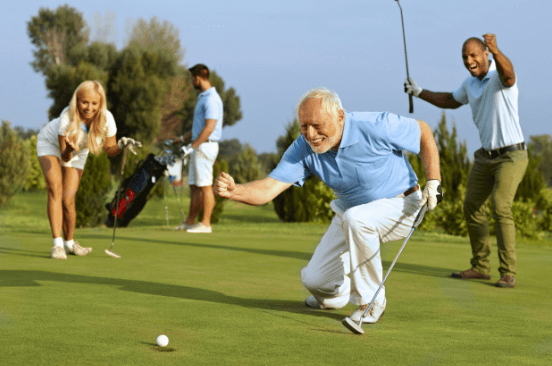Despite being marketed as a sport for all ages, golf is especially popular with seniors due to its many health benefits. Golf is a great sport for seniors who want to stay healthy since it combines physical activity, socialization, and mental stimulation. Golf improves cardiovascular health for elders.
Golf Improves Cardiovascular Health
For many seniors, cardiovascular health is a key issue, making it difficult to find pleasurable, low-impact physical activities. Golf, a moderate-intensity activity, is ideal for heart health. Golf requires walking four to six miles on varied terrain. This gentle but effective workout boosts heart rate and blood flow, essential for cardiovascular fitness.
High-reward, low-impact
Seniors benefit from golf’s low-impact nature. Golf does not strain joints and muscles like jogging or tennis, which older individuals worry about. Golf’s walking is mixed with rest and gentle activity, respecting the body’s age limitations while boosting heart health. This physical activity lowers blood pressure, improves lipid profiles, and boosts circulation, reducing heart disease risk.
Walking the course is more fun and engaging than walking on a treadmill or track to get the necessary daily steps. Golf’s scenic beauty, strategic shot planning, and social contact with other players make exercise fun and less monotonous, encouraging regular involvement.
Increased Aerobic Capability
Golfing frequently improves seniors’ aerobic capacity, which declines with age. Aerobic activity like golf course walking strengthens respiratory muscles and improves lung function. This increase in aerobic capacity can help seniors complete tasks that demand continuous physical effort on the golf course and in daily life.
Swinging a golf club works the arms, back, legs, and core. Keeping all muscle groups engaged helps maintain muscle mass and strength. Seniors must maintain muscle to prevent muscle loss and maintain independence in daily tasks.
Healthy Heart Rate Promotion
The mild effort of golf keeps the heart rate up. Long-term moderate-intensity exercise, like golf, is good for the heart. This strengthens the cardiac muscle, boosting blood circulation. As bodies age, tissues need a consistent supply of oxygen and nutrients for healing and maintenance, which effective blood flow provides.
Golf can also be tailored to individual fitness. Golf carts let players maintain the physical activity of the swing and the strategic mental involvement of the game without traversing the full course. Players can adjust their physical exercise to their health needs and skills by walking various distances with a cart.
Golfing regularly improves elderly cardiovascular health. Golf provides a low-impact, fun type of exercise that helps seniors maintain their physical health and improve their quality of life via social and mental engagement. Golf is suggested for older persons wishing to maintain and improve their cardiovascular health because its effects transcend beyond the course and affect daily life.
Strategic Play Stimulates Mind
Golf is a game of strategy and skill that requires both physical and mental skill. To put well, you must calculate distances, choose the appropriate club, adjust for wind, and read greens. Mental difficulties engage the brain and stimulate cognitive processes. Seniors need constant cognitive engagement. It maintains mental agility and decreases the risk of cognitive decline, including Alzheimer’s and dementia.
Golfers must strategize and make quick judgments, which increases problem-solving and critical thinking. Regular mental workouts can improve cognitive flexibility, which aging threatens. Cognitive flexibility allows you to transition between concepts and think about numerous notions at once. Senior golfers can preserve cognitive flexibility better than non-golfers by strategically stimulating the brain.
Cognitive Benefits of Social Interaction
Golf offers many social opportunities, from casual games with friends to club activities and contests. Seniors, who are more likely to isolate, need these social features for mental wellness. Conversations, sharing experiences, and just being with others can boost happiness and well-being. Conversations, which demand attention, memory, and interpretation of verbal and nonverbal signs, stimulate brain processes.
The social component of golf helps develop a supporting group, which is especially useful for elders. Being part of a community and sustaining friendships reduces stress, mental health difficulties, and life happiness. Golf stimulates regular social encounters, which can strengthen social networks and assist elders cope with aging.
Emotional and Stress Reduction
Golf courses offer tranquility and stress relief. Nature calms the mind, lowering tension and anxiety. Golf is a method for many seniors to unwind and escape the daily grind. Light exercise, fresh air, and attractive scenery can improve mood and reduce sadness and anxiety.
Golfing enhances solar exposure, which regulates circadian rhythms. Vitamin D, which boosts mood and cognition, is found in sunlight. Seniors are more susceptible to cognitive deterioration and mood issues due to vitamin D insufficiency. Golf promotes outdoor activity and Vitamin D, which can improve mental health and cognition.
Golf can boost mental health and delay cognitive deterioration over time. Golf requires strategic thinking, memory, and social interaction, which keeps the brain engaged and healthy. According to neuroscience, cognitively engaged activities can increase brain plasticity, creating new neural connections and a healthier, more resilient brain.





 Manchester United: Pioneers in Commercializing Brand Power
Manchester United: Pioneers in Commercializing Brand Power